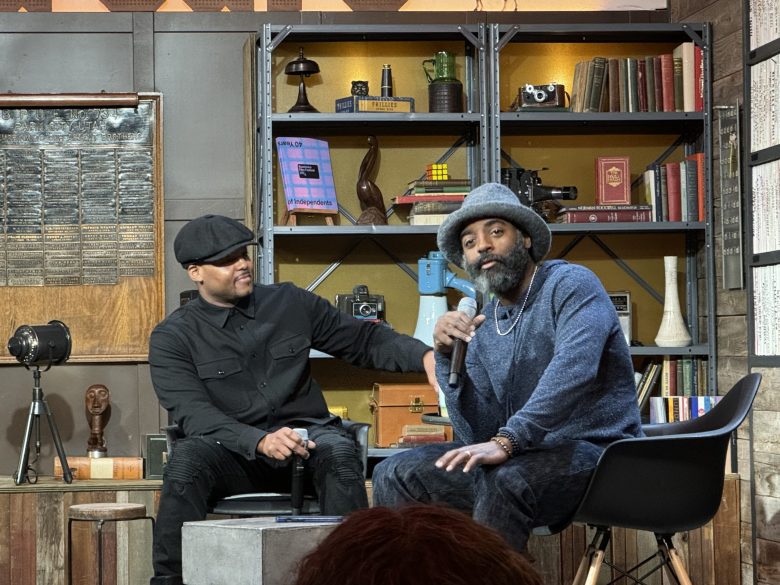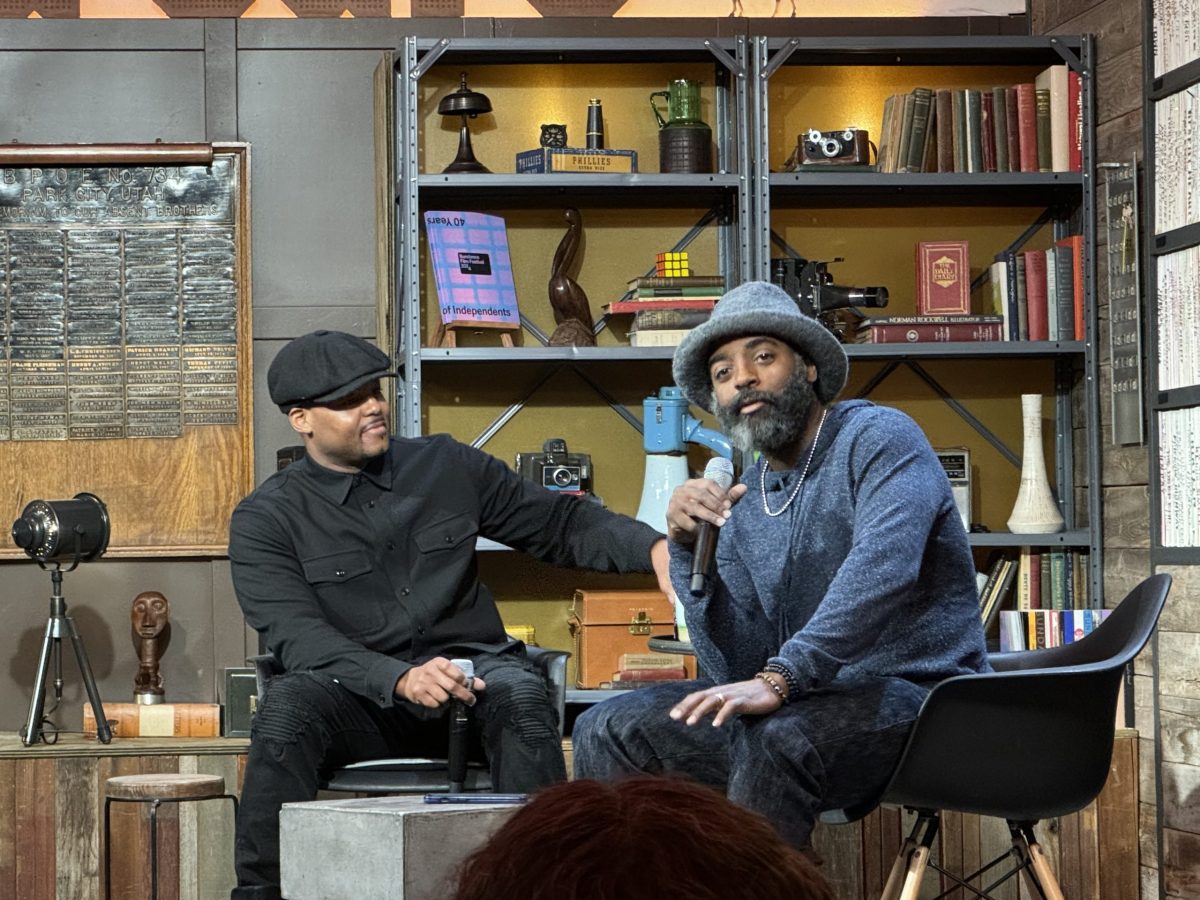
Monday afternoon, festival goers crowded into the Cinema Cafe at the Filmmakers Lodge on Main Street for the chance at an in-depth look behind the story of “Exhibiting Forgiveness,” featured in this year’s U.S. Dramatic Competition category at Sundance.
The talk, titled “Exhibiting Forgiveness, Generational Healing Through Art and Storytelling,” was presented by the John D. and Catherine T. MacArthur Foundation, an organization which “supports creative people and effective institutions committed to building a more just, verdant, and peaceful world,” according to its website.
Painter and director of “Exhibiting Forgiveness” Titus Kaphar was welcomed to the stage along with Reginald Dwayne Betts, poet, attorney and founder of Freedom Reads, a nonprofit which provides micro-libraries in prisons across the country.
The crowd cheered, many of whom had already seen and fallen in love with Kaphar’s directorial debut.
On stage, Kaphar addressed the room.
“You are about to be given an inside look into just two brothers having a conversation. A warning to those of you who may never have observed something like this. It might make you feel a little uncomfortable,” he said amid laughter.
Both artists and activists living in New Haven, Connecticut, the two men were, like Kaphar acknowledged, as close as brothers, and their two philosophic minds bounced from subject to subject with almost telepathic speed and depth.
To start, Betts stood to read a poem he wrote to accompany Kaphar’s film.
“Roughly four days before the talk, say five, Titus announces that I was gonna write a poem that accompanies the film. And that the people in this room would hear it first. We had never discussed such a thing,” said Betts. Kaphar laughed.
The poem, titled “Four Sons” was broken into five parts: a preamble then four sections titled the name of each of the men’s sons. Betts read it to the crowd, beginning with an epilogue from the author Toni Morrison.
“‘If you want to fly you have to give up the things that weigh you down,'” Betts read.
Like “Exhibiting Forgiveness,” the poem explored the complex web of fathers and sons, a fitting intro for the following discussion.
Kaphar wiped tears from his eyes when it finished. “So what if I hadn’t asked him to do that?” he asked the crowd.

They shifted gears, turning their conversation to their work as artists and the inception of “Exhibiting Forgiveness.”
The film is Kaphar’s first exploration into film as a medium, and it tells an almost autobiographical story about a successful artist, Tarrell, who struggles to forgive his drug-addicted father after their unexpected reunion forces him to confront a painful past.
Kaphar’s own work has seen impressive success, with paintings featured in world-class museums like The Museum of Modern Art (MOMA), The Whitney and The Metropolitan Museum of Art (The MET), all in New York. His work often depicts the history and experience of being Black in America, featuring the creative use of cutting, crumbling and layering with canvas.
But with “Exhibiting Forgiveness,” Kaphar chose to highlight his own personal history through the art and events in the film.
“I really wanted to have a conversation about forgiveness in this film,” said Kaphar.
A significant part of that conversation, he said, was redefining forgiveness.
“I had to decide that the biblical version of forgiveness that I was taught was one wherein you will potentially reinjure yourself in order to forgive someone else,” Kaphar said. “How many times do you forgive your brother?” he asked the crowd, “seven times 70 times,” a few voices responded.
“At this age in my life, I don’t believe in that anymore. I can’t believe in that anymore. I’ve seen it hurt people,” said Kaphar.
In the film, like in Kaphar’s own experience, Tarrell’s mother continues to let Tarrell’s abusive and crack-addicted father, La’Ron, come back into her life and do more damage. That definition of forgiveness wasn’t something Kaphar could stomach, so he had to consider another option.
And why? Because holding on to the hurt and anger Tarrell felt towards his father was beginning to damage his relationship with his own son, Jermaine, and his wife, Aisha.
“The entire point is that Tarrell’s decision is to say, ‘I’m not carrying this s*** anymore. I can’t because if I keep carrying this, I’m going to give it to my kids,'” said Kaphar.
Speaking to Betts, whose own father struggled with drug addiction, Kaphar acknowledged that’s what they’d both done in their personal lives.
As the theme of the film emphasized the humanizing of La’Ron, despite his addiction and harm to those who loved him, Betts challenged Kaphar for choosing to put so much emphasis on his father character, who he’d spent 15 years trying to forget.
“We have literally spent like 25 minutes talking about this dude,” said Betts. “How the f*** can you exert so much gravity on somebody’s life for having been so ruinous upon it?”
For the sake of his sons, Kaphar said.
In the end, Tarrell’s own realization leads him to a form of forgiveness that manages to protect his future.
“He says, ‘I forgive you for the past,’ and La’Ron says, ‘We still have the future.’ And Tarrell says, ‘No, not the future. Not the future. I gave you my past. But I can’t give you my future. That belongs to Aisha. That belongs to Jermaine,'” Kaphar said.
The film is meant to invite these types of conversations, Kaphar said, especially for the two men on stage, who admitted their desire to raise their own sons without passing on generational trauma.
“Because of the fact that we come from circumstances that are so broken, we are trying to construct something for ourselves. And we’re trying to redefine what family looks like,” said Kaphar.
“How do you prevent yourself from becoming your father?” said Betts.
“What did we inherit from our fathers? And what is the legacy that we’re gonna leave for our children?” responded Kaphar.
As promised, the two men ended the conversation with more unanswered questions, as the film itself does in many ways.
“This is a profound idea that you’ve exhibited, and I just, I want to say thank you, deeply. Too much harm is done in the name of religion. And (“Exhibiting Forgiveness”) is a profound meditation on this,” said an attendee when they opened the panel up for audience questions.
Kaphar and Betts will be showing “Exhibiting Forgiveness” in prisons across the country, with the goal of making it more accessible to underserved communities. Learn more about Kaphar, his work and his nonprofit, NXTHVN, at kapharstudio.com.

